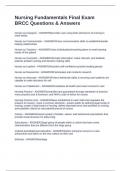Nursing Fundamentals Final Exam
BRCC Questions & Answers
Nurses as Caregiver - ANSWERSprovides care using both art/science of nursing to
meet needs
Nurses as Communicator - ANSWERSUses communication skills to establish/maintain
helping relationships
Nurses as Teachers - ANSWERSUses individualized teaching plans to meet learning
needs of the patient
Nurses as Counselor - ANSWERSProvide information, make referrals, and facilitate
patients problem-solving and decision-making skills
Nurses as Leaders - ANSWERSAssertive self-confidence practice leading groups
Nurses as Researcher - ANSWERSParticipates and conducts research
Nurses as Advocate - ANSWERSProtect individuals rights & securing care/ patients are
capable to make decisions for self
Nurses as Collaborator - ANSWERSFacilitates all health care team involved in care
Nursing Practice - ANSWERScontrolled and guaranteed through standards of practice,
nurse practice acts & licensure, and ANA's code of ethics for nurses
Nursing Practice Acts - ANSWERSlaws established in each state that regulates the
practice of nursing - have 4 common elements - protect public by defining legal scope of
nursing, create a state board of nursing, define important terms and activities in nursing,
and establish criteria for education/licensure of nurses
Culture - ANSWERSshared system of beliefs, values, and behavioral expectations that
provide social structure for daily living.
Subcultures - ANSWERSlarge group of people within a culture that have some
characteristics that are different from the large group
Cultural assimilation/acculturation - ANSWERSwhen someone moves to a new
area/culture and takes on the new culture as their own
Ethnicity - ANSWERSheritage
,Race - ANSWERScategories based on specific physical characteristics
Cultural imposition - ANSWERSbelief that everyone should comform to your own belief
system
Cultural blindness - ANSWERSsomeone ignores differences and continues as thought
they do not exist
Culture conflict - ANSWERSwhen someone is aware of cultural differences, feels
threatened, and responds by ridiculing the other culture to make self feel more secure
ethnocentrism - ANSWERSthe belief that the ideas, beliefs, and practices of ones own
culture are better than those of other cultures
Culture shock - ANSWERSpsychological discomfort or disturbances due to recent move
to new culture perceived as strange
Stereotyping - ANSWERSan assumption that all people that share a culture, ethnic
group, or race act alike
Jewish culture - ANSWERSmen can't touch women other than their wife, same sex care
taking, treatments avoided on sabbath, circumcision done on 8th day of life, no
pork/shellfish, cannot eat milk and meat together, dying patient cannot be left alone,
death cannot be rushed
Jehova's Witness Culture - ANSWERSno blood transfusion, usually carry advance
directive, treat specimens with respect, cannot eat blood or blood products, dont
celebrate holidays
Mormon Culture - ANSWERSwears sacred undergarmets, don't eat alot of meat,
doesn't eat blood products, no caffeine/alcohol, fast once a month
Muslim Culture - ANSWERSmodest/private, same gender nurses, cannot eat pork, cat,
dog, or monkey meat
Altruism - ANSWERSConcern for the welfare and well-being of others - concern for
welfare of patients, other nurses, and other HCP
Autonomy - ANSWERSright to self determination
Human dignity - ANSWERSrespect for inherent worth and uniqueness of individuals
and populations
Integrity - ANSWERSActing in accordance with code of ethics
Social Justice - ANSWERSUpholding moral, legal, and humanistic principles
, Nonmaleficence - ANSWERSavoid causing harm
beneficence - ANSWERSdo good; benefit the patient
Justice - ANSWERSgive each his or her due; act fairly
fidelity - ANSWERSkeep promises (faithful)
paternalism ethical problems - ANSWERS"mothering" the patient - treating the patient
like you're the parent
deception ethical problems - ANSWERSlying/misleading
privacy/social media ethical problems - ANSWERSsharing any information online, even
if patient info is not included
confidentiality ethical problems - ANSWERSsharing information that may or may not be
HIPAA
allocation of scarce resources ethical problems - ANSWERSshort staffing and
distributing nursing care amongst patients
Crime - ANSWERSviolation punishable by the state
Tort - ANSWERSusually settled in civil court with money, less serious
Misdemeanor - ANSWERSless serious crime, usually punishable with a fine,
imprisonment for less than a year
Felony - ANSWERSpunishable by imprisonment for more than a year, usually serious
crimes (rape/murder)
Intentional Tort - ANSWERSassault, battery, defamation, invasion of privacy, false
imprisonment, & fraud
Unintentional Torts - ANSWERSNegligence & malpractice
Assault - ANSWERSthreat or an attempt to make bodily contact with another person
without consent
Battery - ANSWERSan assault that is carried out successfully touches another person
without consent
Defamation of character - ANSWERSSomeone makes negative remarks about another.
Can be spoken (slander) or written (libel)




